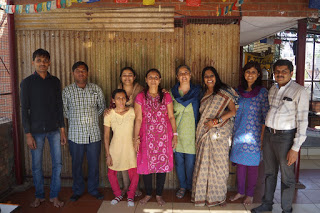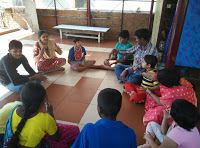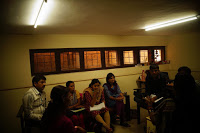Gitanjali writes about her interaction with three organisations from Baruch, Gujarat and draws parallels to what Snehadhara is out to achieve.
The purpose of their visit to Snehadhara is to understand how we work using the Arts to achieve learning outcomes and how one could approach inclusion as holistic learning. We will be facilitating a two day workshop for them that would give them a glimpse of what we do, understand the methodologies at a broad level and also be a part of some of our sessions.
How do we address this huge developmental deficit? School systems have traditionally stressed the importance of teaching all children in a uniform manner. This has made it difficult for them to include those children – such as those with learning disabilities – who learn very differently. In fact, schools are belatedly recognizing that they are also leaving behind many students who are in class, but who too need to learn differently from the uniform approach that they’ve adopted. Lack of inclusion in traditional learning systems, is stemming from their lack of diversity in how these systems see ‘learning’. Clearly the present model of inclusion is not working and one has to look at an integrated system of learning.
Having spent time today with the team from Gujarat, it is humbling to see that in remote villages of India there are people who are set out to give it their all fighting challenges- systemic, personal, financial, and socio-economical.
As an individual working in the field of education, as an organisation, as a special needs adult/parent, as an institution, as a corporate house, as an NGO, as a policy maker, each one of us has a role to play in building this ecosystem.
The enormity of the challenge cannot stop one from addressing it.
Source: SnehadharaBlog



